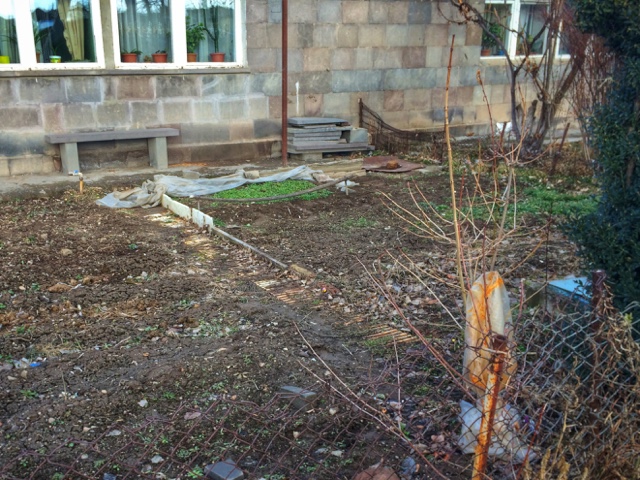I was told by my school principal today that she wanted me to get the school a new gymnasium. It wasn't the first time she has said this to me, and I answered her the same way I always do: "We can try!". The "we" in that answer is especially important. I think my school principal feels that Peace Corps grants are something I can go out and get rather than something we can apply for together as a small part of implementing projects that we plan as a team.
Today, in addition to telling me she wanted a new gym, she had the PE teacher take me down and show me the old gym for the first time. (Prior to this, I was under the impression that our school didn't even have a gym, since the room is locked up and never used). I can see why she wants me to work on getting the space renovated.
At the moment, the gym isn't used at all. Any PE classes that the kids have take place outside on the football field, such as it is:
When it is too cold, too muddy, to rainy or too snowy, PE class is cancelled, and the kids have to stay seated in their classrooms all day. That's a tough thing for a grade-school kid to do. Unlike schools in the US, there is no 'lunch & recess' break for them to relax and burn off excess energy. It's a bad day when PE classes are cancelled due to weather.
The biggest problem (I think) is the floor. Currently it's an uneven concrete that just screams trip-and-fall waiting to happen. Plus, with the level of dental care readily available to many of our families, I think that if a kid falls down and knocks out a tooth here, that tooth stays knocked out.
The second problem is that the lights don't work. Whether this is because there is a problem with the electricity or because the light bulbs themselves are high up and no one has a ladder long enough to change them when the burn out, I don't know. I suppose the firs time to solving this particular problem is going to be finding out exactly why the electricity doesn't work in the first place. Honestly, the lights aren't a huge deal, though: there is plenty of light coming in from the windows in most weather. The only place where this isn't true is in the boy's locker room, which is as dark as an unlit cave at midnight. That's a problem we'll have to fix.
The light in the girl's locker room- I should say 'changing rooms' as there are no lockers- works though, so I was able to see what kind of condition it's in:
I think the first step to rehabbing this space is to give it a good cleaning. What I don't understand is why that hasn't been done already. This space isn't being used at all right now. It's kept locked up. The students don't have access to it- so why are there empty plastic bottles and wrappers on the ground? Why not go through, sweep it out, pick up all the trash, and *then* lock the door behind you? This is one of those cultural differences that I just don't get yet.
We do have some resources to work with- I'm told that the heaters work just fine, which opens up the possibility of afternoon sports in the winter.
I am, however, skeptical of how effectively 6 radiators, nestled into an un-insulated concrete exterior wall, can heat a space of this size with high, high ceilings.
And the school does have some equipment, although one of the priorities the principal and PE teacher both expressed was the need for more.
They'd like to acquire more volleyballs, footballs (soccer balls to us Americans), and basketballs, more hula hoops, and more jump ropes. They'd also like to get a set of lifting weights and a wrestling mat. They also want something called a "goat-chair", which I think is a type of hurdle (certainly, if their pantomimes are anything to go by, you're supposed to jump over it...) but I've never seen one before.
I'm not really focused on the equipment right now- that's such a small part of the problem and so, so easily fixed that I can think about it later.
Right now, I have to worry about getting a new gym floor...



















